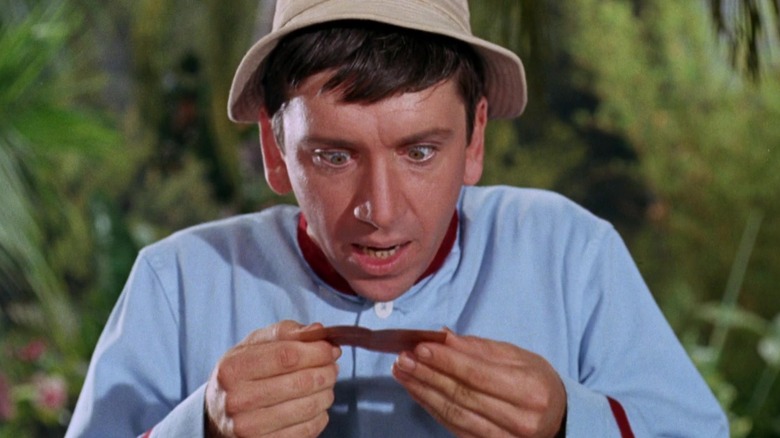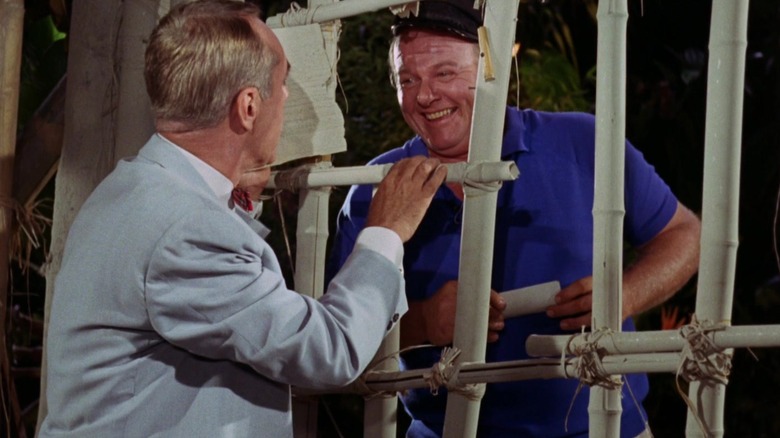Gilligan's Island Has More In Common With Greek Mythology Than You'd Imagine
There is a palpable note of despair and futility that runs through every episode of Sherwood Schwartz's whimsical 1964 sitcom "Gilligan's Island." Each episode begins with a new element arriving at the castaways' tropic island nest — a radio, a satellite, a hot air balloon, an itinerant guest star — deposited there as if by fate. The new "wild card" element-of-the-week will allow the castaways to concoct a way to escape, and the bulk of the episode will entail how they construct their means of egress. But then Gilligan (Bob Denver), fate's Joker, will foolishly bumble the rescue in some way, often because of his own clumsiness or childlike ignorance. The castaways will then fall back into despair, iterating that they are doomed to remain on the island until they die.
Gilligan, in this description, may be described as some kind of ancient, destructive folk deity. Gilligan is a cosmic impediment to freedom, a force of nature that, by his very construction, keeps his compatriots locked forever in Hell. The cycle of "Gilligan's Island" is depressing and futile. Hope arrives, Gilligan breaks the hope, and despair returns. See you next week for another comedic adventure.
One can easily see the myth of Sisyphus in the weekly rhythm of "Gilligan's Island" of course. Sisyphus, as we all know, was damned by Hades to eternally push a boulder up a hill. It was hard, backbreaking labor, and it produced nothing; once the boulder reached the top of the hill, it would merely roll back down, forcing Sisyphus to begin again. The futility of Sisyphus' toil was meant to be the worst part of his afterworldly punishment. You will labor forever and get nothing from it.
That's "Gilligan's Island." Every week, they push and toil, thinking they are accomplishing something. Then their boulder — in this case, Gilligan — rolls down the hill, and they need to start again. Everything is futile.
But then, French philosopher Albert Camus had something to say about Sisyphus that might be relevant to finding hope inside "Gilligan's Island" again.
Albert Camus, the myth of Sisyphus, and Gilligan's Island
We all likely read Camus' 1942 treatise "The Myth of Sisyphus" in our Philosophy 101 class in college. Briefly, Camus looked at Sisyphus as a hopeful figure, and one from whom we can learn a great deal. Camus argued that Sisyphus' labor would be, after enough time, something he became very familiar with. He compared Sisyphus' task with that of the modern factory worker, as they too have to perform repetitive tasks day in and day out, often with nothing to show for it. "It is tragic," Camus wrote, "only at the rare moments when it becomes conscious."
But Camus wanted to delve into Sisyphus' actual thinking as he pushed that boulder. He would see the rock not as a foe, but as something he could attain mastery over. He would "make his rock his thing." Sisyphus, he argued, would eventually have to inevitably accept the meaningless absurdity of his task, and, as a result, just sort of roll with it. Sisyphus can master the futility of life by acknowledging that life is absurd and that he is within his rights to be sarcastic about it. "There is no fate," he wrote, "that cannot be surmounted by scorn." One must imagine Sisyphus happy.
"Gilligan's Island," recall, isn't a very realistic series. It's set in a broad, farcical universe where actual concerns of survival are never addressed. The seven stranded castaways never need to worry about food or water, and their shelters have been built. Like Sisyphus in the afterworld, there is no sense of inevitable death. They already live in a purgatorial state, and their bodies will never deteriorate. And, like Sisyphus, they are doomed to eternally repeat a futile repetitive task that will never bear fruit. In their case, it's the futility of escape.
Gilligan's Island and the hope of existentialism
After enough time, though, if we're to extrapolate the castaways' lives along Camus' theories, they will eventually come to realize that their efforts are always going to end poorly. They may come to understand — in an existential sense — that they are living inside a farce, and that Gilligan exists as their central barricade to happiness. Escape is meaningless ... and that can be freeing. They will continue to try to escape, enjoying the thought and effort they put into every attempt. They will also know that Gilligan will definitely blockade their escape, and they will have to trek back down to the bottom of the mountain to start pushing the boulder again.
Only once the castaways began to acknowledge in a metanarrative sense that they were pawns inside a farce created by Hades — in their case, Sherwood Schwartz — could they joyfully accept their fate and enjoy a sense of content acceptance.
One might point out that the castaways did indeed escape their island prison in the 1979 TV movie "The Castaways of Gilligan's Island," and would go on to play basketball with the Harlem Globetrotters in 1981's "The Harlem Globetrotters on Gilligan's Island," but I will hasten to question the legitimacy of those movies. In 1982, you seem there was an animated "Island" spinoff series called "Gilligan's Planet," wherein the castaways built a rocket to escape their island, only to launch into the cosmos and become stranded on a distant alien world. Even on a cosmic scale, the castaways were fated to remain isolated.
The castaways must open themselves to the gentle indifference of the universe. They will struggle for our entertainment, and they will remain forever trapped. But we must imagine them happy.


